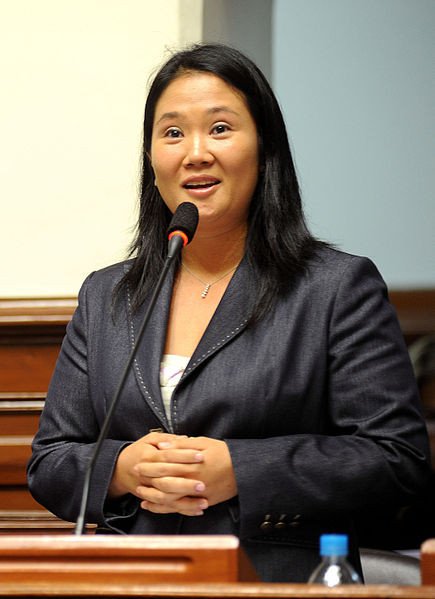Keiko Fujimori, as seen in October, courtesy of Congreso de la Republica del Perú on Flickr via Wikimedia Commons.
LIMA, Dec. 9 (UPI) -- Congresswoman Keiko Fujimori, daughter of jailed former Peruvian President Alberto Fujimori, has joined the 2011 presidential race with a pledge to secure a more inclusive economy to benefit the country's poor.
If elected, Fujimori will face an unusual immediate challenge of whether to pardon her incarcerated father, who was convicted on charges of corruption and human rights violations but is still popular in Peru.
Keiko Fujimori, 34, built her political career promoting the cause of Peru's burgeoning poor of mainly non-European and black origin. She ran several successful campaigns to improve health and social conditions for impoverished Peruvians and their children.
Despite the disgrace visited upon her father, Keiko Fujimori said she would continue the legacy of Alberto Fujimori, a populist right-winger who used controversial methods to crush Peru's Maoist rebels but also liberalized the economy and implemented programs to alleviate the plight of the poor.
Although Peru's economy has boomed with inward investment, significant income disparities divide Peruvians of European, Chinese, Japanese, African, Arab origin and American Indian origin.
Fujimori's entry into the presidential race makes her the third major candidate for the April 2011 vote alongside former Lima Mayor Luis Castaneda, a center-right candidate, and former President Alejandro Toledo, who also favors free trade and foreign investment but under a social progressive banner.
Analysts said Fujimori was widely tipped to catch up on her rivals and build on her support, currently 20 percent of the total.
"We'll govern for all Peruvians, above all the poorest ones," Keiko Fujimori declared in a speech to slum dwellers on the outskirts of Lima.
"We have to keep growing, obviously, but we must grow with more equality," she told supporters.
Figures showed poverty rates dropped in Peru from 50 percent to about 35 percent, largely the result of policies pursued by Alan Garcia, who is barred by law from running for a second term.
Critics say the government can do more to reduce poverty, crime and unemployment but admit the imminent departure of Garcia from power creates new uncertainties for Peru.
Peru's economy is expected to grow 6-7 percent in 2011, largely fueled by booming consumer demand, despite the political uncertainty. Consumer demand overtook the mining sector -- mainstay of the economy -- to become the biggest contributor
to growth, which is likely to reach 8 percent by the end of 2010.
Analysts said although all three front-runners back a continuation of Garcia's policies, the business climate next year could be affected by the investors' perception of the candidates.





